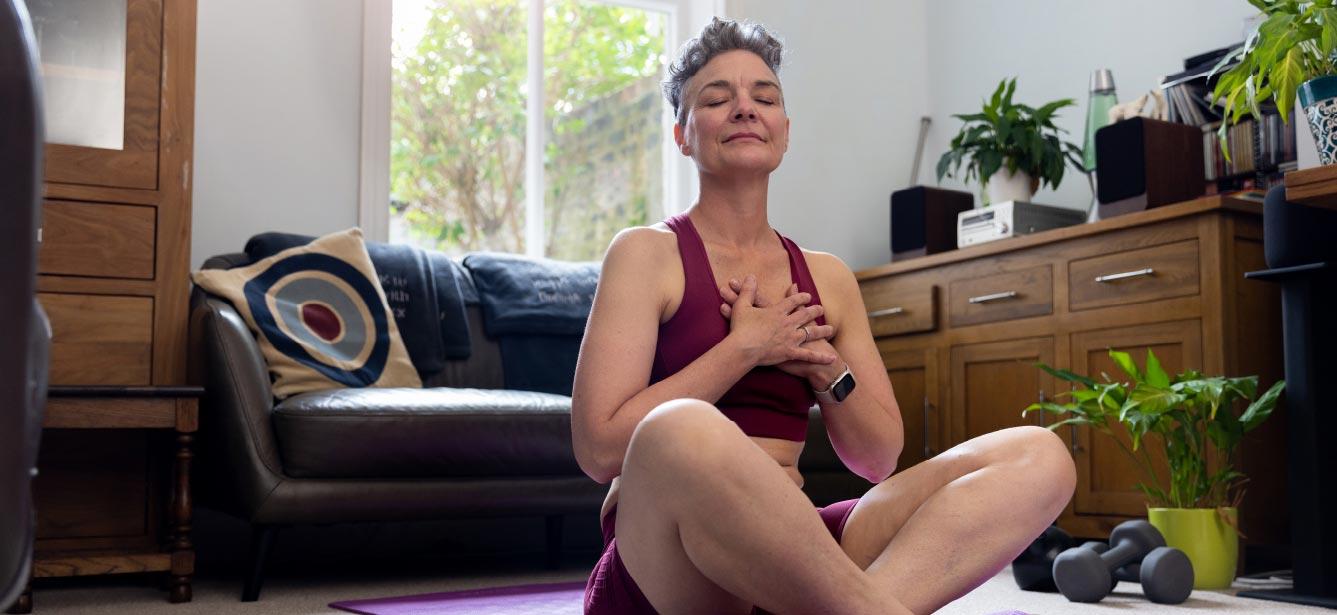
Related Topics
For many people, midlife opens a new and exciting chapter of life: an opportunity to spend more time with grandchildren, to explore new hobbies, to practice self-care, and maybe even to travel. But if you’re a woman going through menopause, you may feel overwhelmed and anxious because of changes to your body.
You might ask, Where did all these new physical issues come from? What’s disrupting my sleep? Why has my libido changed? How do I find my lost energy?
Your questions are normal. Your symptoms are normal. And while every woman’s menopause experience is different, you are definitely not alone.
You can take charge of your menopause journey and turn it into a positive experience. The first step is learning more about what menopause is, why it’s happening, and what you can do to feel better.
What is menopause?
Menopause is a natural, normal aging milestone: a time when your menstrual periods permanently stop and you can no longer become pregnant. How long does menopause last? As with most things in life, it depends. What signals the end of menopause, however, is when you haven’t had any menstrual bleeding or spotting for 12 months in a row.
The years leading up to menopause are called perimenopause or pre-menopause. During this time, the supply of mature eggs in your ovaries decreases. Your ovulation becomes irregular, and your ovaries slow production of the hormones estrogen and progesterone. Experts point to this dramatic drop in estrogen levels as the main reason behind most physical symptoms of menopause.
What is the normal age for menopause?
For most women, menopause commonly begins between the ages of 45 and 55. The transition lasts an average of seven years, but can extend to as many as 14. Where will your experience fall? According to some studies, you can use your mother’s age and experience (if you know these things) as a benchmark for when you’ll first enter menopause and how long it will last.
Usually, menopause occurs naturally. But certain situations can cause some women to start early. These include oophorectomy (surgical removal of the ovaries); exposure to radiation; or chemotherapy treatments. Early menopause is also more common among women who smoke, have never been pregnant, or who started their periods at age 11 or younger.
What are the symptoms of menopause?
The menopausal transition affects each person differently. Some women can breeze through this time with no changes except irregular menstrual periods. Others, however, experience a variety of physical symptoms ranging from mild to debilitating. Menopause symptoms can include (but not be limited to):
- Unexplained weight gain
- Sleep disturbances
- “Brain fog” and other cognitive issues
- Hot flashes (or hot flushes) and/or night sweats
- Vaginal atrophy – thinning, drying, and inflammation of vaginal walls
- Increased facial hair or hair loss on scalp
- Heartbeat irregularities
- Increased anxiety
- Decreased libido
- Fatigue
- Irritability and other mood changes
Menopause can also trigger less-obvious physical changes as well. The significant drop in estrogen may cause loss of bone density and increase your risk for osteoporosis. Plummeting estrogen production can also raise your cholesterol levels and elevate your risk for heart disease and stroke. That’s why it’s essential to maintain a healthy lifestyle and see your doctor regularly during this transition, said menopause expert Maryon Stewart.
Stewart is a British author and broadcaster who has been showing women how to control their menopause symptoms naturally for 30 years. “Making dietary and lifestyle changes is a viable option for women at the time of their menopause,” she tells NCOA.
How do health care providers treat menopause symptoms?
Not all women need to treat their menopause symptoms. But if yours are severe enough to impact your well-being, certain medical and lifestyle interventions may offer relief. A few common approaches include:
Hormone therapy (HT)
Hormone therapy aims to ease menopause symptoms by increasing the levels of estrogen and/or progesterone in your body. If you choose HT, your doctor may prescribe pills, creams, transdermal (skin) patches, or another delivery method. HT may involve estrogen alone or a combination of estrogen and progesterone.
You may have heard that HT increases the risk of serious health events such as blood clots, stroke, and even some cancers. This widely shared wisdom stems from the long-term, national Women’s Health Initiative study, whose objectives have commonly been misunderstood and misinterpreted among the nonmedical population.
The study actually wanted to find out if doctors should use hormone replacement therapy to prevent these serious events in older women who already were well past menopause. As researchers discovered, HRT is not effective for this use. But it can be safe for younger women just entering menopause who need short-term relief from symptoms like hot flashes and night sweats.
More recent studies have concluded that using HT safely is highly dependent on a woman’s age, medical history, and other factors.1 For this reason, be sure to discuss the pros and cons of HT with your health care provider before deciding on this treatment approach.
Non-hormonal medications and supplements
Certain prescription medications can be effective in treating menopause symptoms. These include gabapentin (Neurontin) and clonidine (Catapres) for treating hot flashes and selective serotonin reuptake inhibitors (SSRIs) for treating both hot flashes and depression. There are other non-hormonal treatments for menopausal symptoms, too, including: vaginal lubricants to reduce discomfort during sexual intercourse, and moisturizers that soothe irritated vaginal tissue.
Some people choose over-the-counter supplements, such as black cohosh and red clover, to help relieve their menopause symptoms. How effective are they? Studies of these and other supplements for menopause symptoms are inconclusive. Also, herbal remedies can have side effects or drug interactions, so be sure to talk to your health care provider before adding one or more to your regimen.
Lifestyle changes
If you prefer to avoid HT and prescription medications, simple lifestyle changes and habits may help you manage your menopausal symptoms naturally. These changes might include:
- Managing stress through relaxation techniques like yoga and meditation
- Exercising regularly
- Reducing caffeine and alcohol consumption
- Quitting smoking
- Eating a balanced, nutrient-rich diet
- Practicing good sleep hygiene
- Maintaining a healthy weight
With a little science-based knowledge, menopause can be the beginning of a whole new, fulfilling chapter in a woman’s life,” Stewart said.
Be your own menopause advocate
October is World Menopause Month. But every day is the right day to focus on your midlife health and wellness.
If you're struggling with this transition, having an honest conversation with your health care professional is a great place to start. Together, you can review your menopause symptoms, discuss your family and medical history, and weigh your options for safe and effective treatment.
Having trouble finding a supportive provider to talk to about menopause? Locate a menopause clinician in your area using the North American Menopause Society directory.
Sources
1. Howard N. Hodis, et al. Menopausal Hormone Replacement Therapy and Reduction of All-Cause Mortality and Cardiovascular Disease: It Is About Time and Timing. The Cancer Journal. May/June 2022. Found on the internet at https://journals.lww.com/journalppo/abstract/2022/05000/menopausal_hormone_replacement_therapy_and.9.aspx



